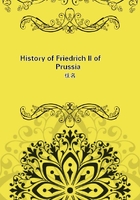
第41章 @@(18)
This same Friedrich III., Great-grandson of Conrad the first Burggraf, was he that got the Burggraviate made hereditary in his family (A.D. 1273); which thereby rose to the fixed rank of Princes, among other advantages it was gaining. Nor did this acquisition come gratis at all, but as the fruit of good service adroitly done; service of endless importance as it proved.
Friedrich's life had fallen in times of huge anarchy; the Hohenstauffen line gone miserably out,--Boy Conradin, its last representative, perishing on the scaffold even (by a desperate Pope and a desperate Duke of Anjou); [At Naples, 25th October, 1268.] Germans, Sicilian Normans, Pope and Reich, all at daggers-drawn with one another; no Kaiser, nay as many as Three at once!
Which lasted from 1254 onwards; and is called "the Interregnum,"or Anarchy "of Nineteen Years," in German History.
Let us at least name the Three Kaisers, or Triple-elixir of No-Kaiser; though, except as chronological landmarks, we have not much to do with them. First Kaiser is William Count of Holland, a rough fellow, Pope's protege, Pope even raising cash for him;till William perished in the Dutch peat-bogs (horse and man, furiously pursuing, in some fight there, and getting swallowed up in that manner); which happily reduces our false Kaisers to two:
Second and Third, who are both foreign to Germany.
Second Kaiser is Alphonso King of Castille, Alphonso the Wise, whose saying about Ptolemy's Astronomy, "That it seemed a crank machine; that it was pity the Creator had not taken advice!" is still remembered by mankind;--this and no other of his many sayings and doings. He was wise enough to stay at home; and except wearing the title, which cost nothing, to concern himself very little about the Holy Roman Empire,--some clerk or two dating "TOLETI (at Toledo)," did languidly a bit of official writing now and then, and that was all. Confused crank machine this of the German Empire too, your Majesty? Better stay at home, and date "TOLETI."The Third false Kaiser--futile call him rather, wanting clear majority--was the English Richard of Cornwall; younger Son of John Lackland; and little wiser than his Father, to judge by those symptoms. He had plenty of money, and was liberal with it;--no other call to Germany, you would say, except to get rid of his money;--in which he succeeded. He lived actually in Germany, twice over for a year or two:--Alphonse and he were alike shy of the Pope, as Umpire; and Richard, so far as his money went, found some gleams of authority and comfortable flattery in the Rhenish provinces: at length, in 1263, money and patience being both probably out, he quitted Germany for the second and last time;came home to Berkhamstead in Hertfordshire here, [Gough's
Camden, i.339.] more fool than he went. Till his death (A.D. 1271), he continued to call himself, and was by many persons called, Kaiser of the Holy Roman Empire;--needed a German clerk or two at Berkhamstead, we can suppose: but never went back;preferring pleasant Berkhamstead, with troubles of Simon de Montfort or whatever troubles there might be, to anything Germany had to offer him.
These were the Three futile Kaisers: and the LATE Kaiser Conrad's young Boy, who one day might have swept the ground clear of them, perished,--bright young Conradin, bright and brave, but only sixteen, and Pope's captive by ill luck,--perished on the scaffold; "throwing out his glove" (in symbolical protest) amid the dark mute Neapolitan multitudes, that wintry morning. It was October 25th, 1268,--Dante Alighieri then a little boy at Florence, not three years old; gazing with strange eyes as the elders talked of such a performance by Christ's Vicar on Earth.
A very tragic performance indeed, which brought on the Sicilian Vespers by and by; for the Heavens never fail to pay debts, your Holiness!--Germany was rocking down towards one saw not what,--an Anarchic Republic of Princes, perhaps, and of Free Barons fast verging towards robbery? Sovereignty of multiplex Princes, with a Peerage of intermediate Robber Barons? Things are verging that way.
Such Princes, big and little, each wrenching off for himself what lay loosest and handiest to him, found it a stirring game, and not so much amiss. On the other hand, some voice of the People, in feeble whimperings of a strange intensity, to the opposite effect, are audible to this day. Here are Three old Minstrels (MINNESANGER) picked from Manesse's Collection by an obliging hand, who are of this date, and shall speak each a word:--No. 1 LOQUITOR (in cramp doggerel, done into speech): "To thee, O Lord, we poor folk make moan; the Devil has sown his seeds in this land! Law thy hand created for protection of thy children:
but where now is Law? Widows and orphans weep that the Princes do not unite to have a Kaiser."No. 2: "The Princes grind in the Kaiser's mill: to the Reich they fling the siftings; and keep to themselves the meal. Not much in haste, they, to give us a Kaiser."No. 3: "Like the Plague of Frogs, there they are come out;defiling the Reich's honor. Stork, when wilt thou appear, then,"and with thy stiff mandibles act upon them a little? [Mentzel, Geschichte der Deutschen, p. 345.]